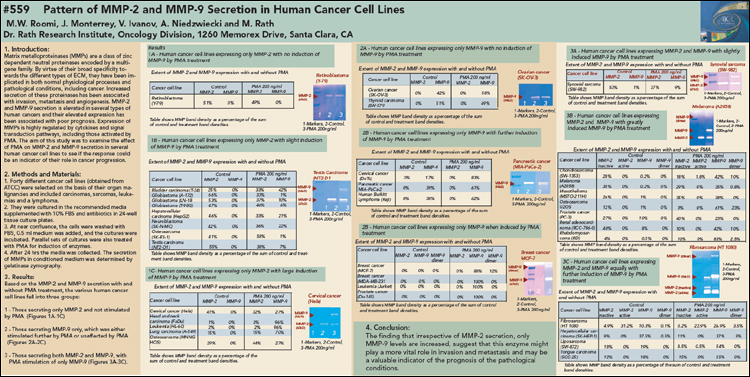M.W. Roomi, J. Monterrey, V. Ivanov, A. Niedzwiecki and M. Rath
Dr. Rath Research Institute, Oncology Division, 1260 Memorex Drive, Santa Clara, CA
Presented at:
98th Annual Meeting of the AACR, Los Angeles, CA, April 14-18, 2007
Published in:
Proceedings of the 98th Annual Meeting of the AACR, Abstract #559, p 114
Abstract
Introduction:
Matrix metalloproteinases (MMPs) are a class of zinc dependent neutral proteinases encoded by a multigene family. By virtue of their broad specificity towards the different types of ECM, they have been implicated in both normal physiological processes and pathological conditions, including cancer. Increased secretion of these proteinases has been associated with invasion, metastasis and angiogenesis. MMP-2 and MMP-9 secretion is elevated in several types of human cancers and their elevated expression has been associated with poor prognosis. Expression of MMPs is highly regulated by cytokines and signal transduction pathways, including those activated by PMA. The aim of this study was to examine the effect of PMA on MMP-2 and MMP-9 secretion in several human cancer cell lines to see if the response could be an indicator of their role in cancer progression.
Methods:
Forty different cancer cell lines (obtained from ATCC) were selected on the basis of their organ malignancies and included both carcinomas and sarcomas. They were cultured in the recommended media supplemented with 10% FBS and antibiotics in 24-well tissue culture plates. At near confluence, the cells were washed with PBS, 0.5 ml medium was added, and the cultures were incubated. Parallel sets of cultures were also treated with PMA for induction of enzymes. After 24 hrs the media was collected. The secretion of MMPs in conditioned medium was determined by gelatinase zymography.
Results:
Based on the MMP-2 and MMP-9 secretion with and without PMA treatment, the various human cancer cell lines fell into three groups: 1) Those secreting only MMP-2 and not stimulated by PMA; 2) Those secreting MMP-9 only, which was either stimulated further by PMA or unaffected by PMA, and 3) Those secreting both MMP-2 and MMP-9, with PMA stimulation of only MMP-9.
Conclusion:
The finding that irrespective of MMP-2 secretion, only MMP-9 levels are increased, suggest that this enzyme might play a more vital role in invasion and metastasis and may be a valuable indicator of the prognosis of the pathological conditions.
Comment
Matrix metalloproteinases (MMPs), a class of zinc dependent neutral proteinases encoded by a multigene family, have been implicated in cancer. MMP-2 and MMP-9 secretion is elevated in several types of human cancers and their elevated expression has been associated with poor prognosis. Expression of MMPs is highly regulated by cytokines and signal transduction pathways, including those activated by PMA. In this study, we examined the effect of PMA on MMP-2 and MMP-9 secretion in several human cancer cell lines. Based on the MMP-2 and MMP-9 secretion with and without PMA treatment, the various human cancer cell lines fell into three groups: 1) Those secreting only MMP-2 and not stimulated by PMA; 2) Those secreting MMP-9 only, which was either stimulated further by PMA or unaffected by PMA, and 3) Those secreting both MMP-2 and MMP-9, with PMA stimulation of only MMP-9. The finding that irrespective of MMP-2 secretion, only MMP-9 levels are increased, suggest that this enzyme might play a more vital role in invasion and metastasis and may be a valuable indicator of the prognosis of the pathological conditions.
